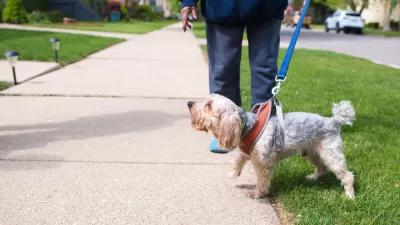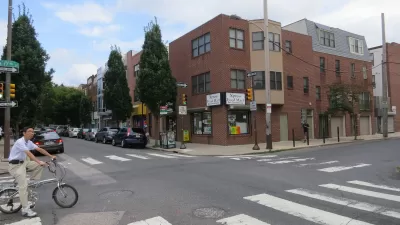The Bacon's Rebellion blog focuses on the potential of suburbs to meet the demands of a growing population with different lifestyles and expectations for their communities than previous generations.

James A. Bacon follows on a public appearance by Ellen Dunham-Jones, an architecture professor at the Georgia Institute of Technology and co-author of Retrofitting Suburbia, by making a controversial (these days) claim: that the transformation of the suburbs may be "more radical" than the changes taking place in urban cores.
In fact, writes Bacon, "real estate developers are reinventing suburban structures from the inside out."
"Shopping malls surrounded by seas of asphalt are being converted into town centers. Big box stores are becoming public recreation centers. Fifty-year-old shopping centers built over streams are being torn down and the waterways restored as greenways."
The bulk of Bacon's argument in the article, following the lead of Dunham-Jones, is that change is necessary, but also completely possible, for suburbs, especially along three broad categories (more detail provided in the article): "From single-use to mixed use," "Regreening," and "Walkability."
FULL STORY: Hope for the Burbs

Maui's Vacation Rental Debate Turns Ugly
Verbal attacks, misinformation campaigns and fistfights plague a high-stakes debate to convert thousands of vacation rentals into long-term housing.

Planetizen Federal Action Tracker
A weekly monitor of how Trump’s orders and actions are impacting planners and planning in America.

In Urban Planning, AI Prompting Could be the New Design Thinking
Creativity has long been key to great urban design. What if we see AI as our new creative partner?

King County Supportive Housing Program Offers Hope for Unhoused Residents
The county is taking a ‘Housing First’ approach that prioritizes getting people into housing, then offering wraparound supportive services.

Researchers Use AI to Get Clearer Picture of US Housing
Analysts are using artificial intelligence to supercharge their research by allowing them to comb through data faster. Though these AI tools can be error prone, they save time and housing researchers are optimistic about the future.

Making Shared Micromobility More Inclusive
Cities and shared mobility system operators can do more to include people with disabilities in planning and operations, per a new report.
Urban Design for Planners 1: Software Tools
This six-course series explores essential urban design concepts using open source software and equips planners with the tools they need to participate fully in the urban design process.
Planning for Universal Design
Learn the tools for implementing Universal Design in planning regulations.
planning NEXT
Appalachian Highlands Housing Partners
Mpact (founded as Rail~Volution)
City of Camden Redevelopment Agency
City of Astoria
City of Portland
City of Laramie





























